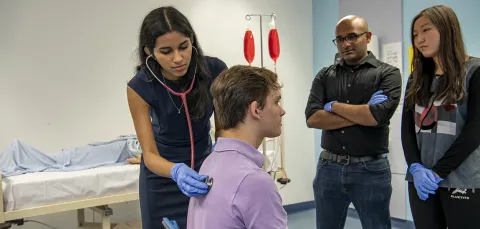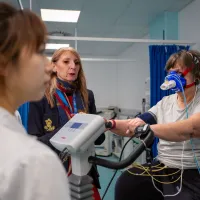About this course
Develop the skills needed to become a world-changing leader in public health on our practical master's degree.
On our Master of Public Health (MPH) course, you'll learn how to promote health, prevent disease and address major global threats to the health landscape. Our leading experts in the sector will help you gain the skills you need to start a career that makes a difference on a local, national and global scale.
Throughout the MPH Public Health course, you will:
- gain a broad understanding of the political, social and economic factors that influence health
- develop professional knowledge and skills to contribute to the health landscape
- learn how to promote and influence the population's health and reduce health inequalities
- evaluate research and policy using appropriate methodological principles and critical thought
- personalise your learning to your interests through a wide range of optional modules
- prepare to work effectively in a multidisciplinary environment, build working relationships, lead teams and collaborate with others
You'll be taught by experts from across the university, including senior academics actively involved in research, as well as practitioners from the wider public health professional community.
We recognise that public health is global health, and celebrate the diversity of our students on our master's in public health. You'll be working in an international environment, where your fellow students come from varied backgrounds all around the world.
Undergraduate medical students can study this course as an intercalated degree. Intercalation means that you'll take a year out of your undergraduate medicine degree to gain this extra award.
Find out more at our master’s in public health webinars
We are hosting several free webinars to help you make an informed choice about our master’s in public health course.
These pre-entry webinars are open to any prospective students – whether you're exploring your options, you've already applied, or you're an offer holder.
During the webinars, which are hosted on Microsoft Teams, you’ll have the opportunity to connect with the programme team, teachers and alumni.
You can ask any questions you have about the master’s in public health, gain an insight into the course, and understand what studying with us is really like.
2025 webinar dates:
Thursday 13 November, 9am to 10am
2026 webinar dates:
- Thursday 8 January, 2pm to 3pm
- Thursday 5 March, 10am to 11am
- Thursday 14 May, 1pm to 2pm
- Monday 29 June, 10am to 11am
To register for one of our master's in public health webinars, please complete our short form.
If you’re unable to attend on any of the above dates, please email our MPH Public Health team at mph@soton.ac.uk.
Flexible study
If you prefer, you can apply to study this course as:
- a 2 year part-time master's (study the same course content over 2 years), or a 3 year + part-time master's (study the same course content over 3 to 5 years)
- a postgraduate certificate (PGCert) - study full-time over 1 year, or part-time over 2 years
- a postgraduate diploma (PGDip) - study full-time over 1 year, or part-time over 2 to 4 years
You can also take a single module as part of continuing professional development (CPD). Explore modules that are available as CPD
Your modules and fees may vary if you choose a different study option.
We regularly review our courses to ensure and improve quality. This course may be revised as a result of this. Any revision will be balanced against the requirement that the student should receive the educational service expected. Find out why, when, and how we might make changes.
Our courses are regulated in England by the Office for Students (OfS).
Course lead
This course is led by Professor Emma Plugge. Emma is a public health-trained doctor who works in the UK and overseas. She is also a researcher at our Population Health Sciences centre, focusing on the health of marginalised populations. View Emma's staff profile for more information.
Accreditations

International Union for Health Promotion and Education
What it's like to study Public Health at Southampton
Learn more about this subject area

The course highlights the importance of listening to the communities affected by these decisions and not just the data. It’s not just about making changes on paper.

During my undergraduate degree, I had the opportunity to take a lot of interdisciplinary modules like global health, which allowed me to expand my knowledge and guided me in the decision to pick Public Health as a master's
Course locations
This course is based at University Hospital Southampton and Highfield.
Awarding body
This qualification is awarded by the University of Southampton.
Entry requirements
To apply for MPH Public Health, you'll typically need a 2:1 degree. We may consider a 2:2 degree if you can also demonstrate relevant professional experience or a strong commitment to public health.
We accept candidates with a wide range of degrees. You must demonstrate how your degree and interests relate to public health, as well as your numerical competence. Please contact the Course Lead, Professor Emma Plugge if you would like to discuss further.
Find the equivalent international qualifications for your country.
Our master's in public health is also available as an intercalated degree for undergraduate medical students, who have completed at least 3 years of their programme.
English language requirements
If English is not your first language, you must show that you can use English to the level we require. Visit our English language pages to find out which qualifications we accept and how you can meet our requirements.
If you are taking the International English Language Testing System (IELTS), you must get at least the following scores:
IELTS score requirements
- overall score
- 6.5
- reading
- 6.5
- writing
- 6.5
- speaking
- 6.5
- listening
- 6.5
If you do not meet the English language requirements through a test or qualification, you may be able to meet them by completing one of our pre-sessional English programmes before you start your course.
Pre-masters
If you don’t meet direct entry requirements, you can apply to complete a Pre-Master's programme through our partnership with OnCampus.
You'll progress to your chosen course after successfully completing the programme. Find out more about Pre-Master's programmes for international students.
Recognition of professional experience
If you don't have the exact entry requirements, but you have significant work experience in this sector we’ll assess your relevant professional experience, your subject knowledge and your aptitude for learning.
Your application will be considered on individual merit and you may be asked to attend an interview.
Got a question?
Please contact us if you're not sure you have the right experience or qualifications to get onto this course.
Email: enquiries@southampton.ac.uk
Tel: +44(0)23 8059 5000
Course structure
Your studies will run for one year, from September through to the following September.
This information refers to the full-time MPH Public Health course. Your modules and fees may vary if you choose a different study option.
Semester 1 overview
In semester 1, you'll study 5 compulsory modules:
- Basic Epidemiology
- Foundations in Public Health
- Foundations of Qualitative Research for Health
- Foundational Statistical methods
- Professional Development
You'll also be able to choose from a wide range of optional modules.
At the end of semester 1, you'll decide whether to follow the practice or research pathway. You'll have plenty of support to ensure you make the right decision for your future career.
As well as the taught modules, you'll have the opportunity to engage in a focused package of activities aimed at developing your learning and preparing you for your future career, at whatever level. This includes:
- professional one-to-one mentoring
- seminar series
- internships and work experience
Semester 2 overview
In semester 2, you'll study 2 compulsory modules:
- Improving Population Health: Theory to Action
- Professional Development
You'll also be able to choose from a wide range of optional modules.
From May, you will work on your dissertation. You can find out more about the dissertation in the learning and assessment section of this page.
Want more detail? See all the modules in the course.
Modules
The modules outlined provide examples of what you can expect to learn on this degree course based on recent academic teaching. As a research-led University, we undertake a continuous review of our course to ensure quality enhancement and to manage our resources. The precise modules available to you in future years may vary depending on staff availability and research interests, new topics of study, timetabling and student demand. Find out why, when and how we might make changes.
For entry in academic year 2025 to 2026
Year 1 modules
You must study the following modules :
Basic Epidemiology
This module focuses on the basic epidemiological methods and approaches that underpin an evidence-based approach to public health research and practice. The module covers each of the main types of epidemiological study design and provides a framework for ...
Dissertation by Research/Professional Project
You have the option of doing a dissertation by research or a professional project. Dissertation by Research: This will be a hypothesis driven research project that entails small-scale empirical research involving quantitative or qualitative research me...
Foundational Statistical Methods
This module provides an introduction to the use of statistical methods for the analysis of quantitative data and their application in public health. This will include descriptive statistics and basic inferential statistics. The emphasis will be on the pra...
Foundations in Public Health
Students will learn about the fundamentals of public health policy and practice. The module will enable students to understand the historical context of public health and the most important current public health challenges globally.
Foundations of Qualitative Research for Health
Understanding qualitative research methods and knowing how to interpret findings and conclusions from qualitative research is fundamental to being able to critique an evidence base. This module teaches you the underpinnings of qualitative research methods...
Improving Population Health: Theory to Action
The World Health Organisation’s 1986 Ottawa Charter for Health Promotion is seen by many as a "gold standard" for Health Promotion. This module explores the principles of the Charter: that health is created in the settings of daily life; that improving he...
Professional Development
The curriculum for the MPH Public Health is informed by the public health standards of the Faculty of Public Health and the UK Public Health Register. It is recognised by the International Union for Health Promotion and Education. These standards encompa...
You must also choose from the following modules :
Advanced Epidemiology
This module focuses on a range of epidemiological methods, concepts and approaches beyond those taught in the Basic Epidemiology module, to explore advanced quantitative methods used in epidemiological studies, and to apply these methods in research and p...
Advanced Statistical Methods in Epidemiology
This module focuses on the application of statistical methods specially developed for epidemiological study data. Topics include the basic disease occurrence measures of prevalence and incidence with their role in surveillance including standardization, M...
Applied Qualitative Research for Health
This module builds on the foundations of qualitative research for health and will demonstrate how to apply these to qualitative research design. Key methods of data collection are explored further, alongside prominent analytical techniques used when condu...
Behavioural Operations
This module aims to develop your capabilities of addressing behavioural issues in an operational context. It goes beyond the typical focus on single decisions taken by an individual to decision making—possibly involving some strategic considerations—in wh...
Communicable Disease Control
This module covers the health protection aspects of communicable disease, including the biology, clinical features and control of such cases.
Core Skills in GIS
This module is intended to provide foundational GIS skills for various Masters-levels programmes (such as the MSc in Applied GIS and Remote Sensing and MSc in Sustainability). It is intended to introduce Geographical Information Systems and Science to tho...
Critical Issues in Global Health: Concepts and Case Studies
This module provides a comprehensive overview of current issues and challenges in global health. Using relevant case studies, it will discuss trends and determinants of both communicable and non-communicable diseases, as well as assessing possible effec...
Engaging and involving the public with your science
Solving complex medical research questions and refining clinical care works best when done in collaboration between diverse public (including patients), researchers and health care practitioners. This sort of partnership requires exchange of knowledge, t...
Evaluation for Public Health
Society has limited resources available to meet unlimited wants with respect to achieving health. Pressures from demographic change, technological advances and changing lifestyle habits make it important to evaluate what health programmes can be provided ...
GIS for Analysis of Health
This module is intended to introduce students who have already studied the principles of geographical information systems (GIS) to the concepts, methods and techniques involved in using GIS for the analysis of health. Academic study of the geography of he...
Managing Complexity, Uncertainty and Subjectivity
This module addresses the inter-related activities of defining, developing, exploring and working with ill-structured organisational problems. Such activities are often classed as problem structuring activities, and they can be contrasted with activities...
Methods and Analysis of Global Health Trends and Differentials
The primary objective of this module is to provide an overview of the conceptual, methodological and empirical basis for quantifying levels of population health focusing on low income countries. More specifically, the module covers: •The conceptual un...
Nutrition and Health
This module develops your knowledge and understanding of the causal relationship between nutrition, activity and health and the need to consider nutritional related problems in the context of global strategic ambitions, including the Sustainable Developme...
Population, Poverty & Policy
During the module you will develop your key skills in: 1. Understanding and exploring the associations between population, poverty and policy issues in a range of countries and setting 2. Analysing complex information and producing well-argued and s...
Learning and assessment
Learning
On our master's in public health, we take a variety of approaches to accommodate all learning styles. We'll teach you through a combination of:
- small group-facilitated learning
- interactive and practical sessions
- seminars and tutorials
- lectures
We have an emphasis on integrated learning, with theory and practical application of concepts embedded in our approach to teaching. Modules take a bespoke approach to their teaching methods, and are designed to maximise interaction and learning. These approaches are supported by our assessment strategy, as well as your integration with the wider research work in Population Health Sciences.
Teaching takes place in 10-week blocks for semesters 1 and 2, followed by a 6-week period for you to work on your assessments.
Assessment
Your assessments differ by module, but are all carefully designed to test the concepts you'll learn in the module in an authentic way. This means that these assessments require you to apply your knowledge, skills and understanding to real-world situations or problems.
We use a variety of assessment methods across the programme, including:
- written assignments, such as a research proposal or a health needs assessment
- group work
- oral presentations
- online tests
We have built formative assessments with individual feedback into each module. These assessments will develop your learning and act as a stepping stone to help you achieve your best in your final assessments.
Assessments take place after teaching in semesters 1 and 2, and you'll have 6 weeks to prepare your assessments. We have put robust quality assurance processes in place for the marking and moderation of assessments, including external oversight.
Dissertation
The dissertation module towards the end of your programme is a great opportunity to put everything you have learned into practice, by doing your own research.
You'll work with one-to-one support from an expert supervisor. Your supervisor might be based at the University, or in the NHS, local authority public health or another organisation, such as the voluntary sector or the UK Health Security Agency (UKHSA).
Your research project will be one of the following types:
- systematic, scoping, policy or other review
- professional project, such as a needs assessment, service evaluation or audit
- qualitative or quantitative data analysis
Our dissertation projects cover a wide range of local, national and global public health topics. We are very flexible, and happy to work with you to make sure you are working on an area of public health research you are passionate about.
Academic Support
We are proud to offer a high level of bespoke academic support, and enable every student to maximise their potential.
You'll have a personal academic tutor who will work with you one-to-one, as well as regular advice and support from the core programme team.
You can also access central University support, such as the Academic Skills Hub, in a variety of formats, including:
- in-person appointments
- online appointments
- webchats
- drop-in sessions
- study cafés
Careers and employability
The employability and enterprise skills you'll gain from this course are reflected in the Southampton skills model. When you join us you'll be able to use our skills model to track, plan, and benefit your career development and progress.
Download skills overview

Work experience opportunities
Choosing to do work experience is a great way to enhance your employability, build valuable networks, and evidence your potential. Learn about the different work and industry experience options at Southampton.
Careers services and support
We are a top 20 UK university for employability (QS Graduate Employability Rankings 2022). Our Careers, Employability and Student Enterprise team will support you. This support includes:
- work experience schemes
- CV and interview skills and workshops
- networking events
- careers fairs attended by top employers
- a wealth of volunteering opportunities
- study abroad and summer school opportunities
We have a vibrant entrepreneurship culture and our dedicated start-up supporter, Futureworlds, is open to every student.
Your career ideas and graduate job opportunities may change while you're at university. So it is important to take time to regularly reflect on your goals, speak to people in industry and seek advice and up-to-date information from Careers, Employability and Student Enterprise professionals at the University.
Fees, costs and funding
Tuition fees
Fees for a year's study:
- UK students pay £11,500.
- EU and international students pay £31,200.
Deposit
If you're an international student on a full-time course, we'll ask you to pay £2,000 of your tuition fees in advance, as a deposit.
Your offer letter will tell you when this should be paid and provide full terms and conditions.
Find out about exemptions, refunds and how to pay your deposit on our tuition fees for overseas students page.
What your fees pay for
Your tuition fee covers the full cost of tuition and any exams. The fee you pay will remain the same each year from when you start studying this course. This includes if you suspend and return.
Find out how to pay your tuition fees.
Accommodation and living costs, such as travel and food, are not included in your tuition fees. There may also be extra costs for retake and professional exams.
Explore:
10% alumni discount
If you’re a graduate of the University of Southampton, you could be eligible for a 10% discount on your postgraduate tuition fees.
Postgraduate Master’s Loans (UK nationals only)
This can help with course fees and living costs while you study a postgraduate master's course.
If you study part-time, you may not be eligible for this loan. Find out if you're eligible.
Southampton Medicine Postgraduate International Scholarship
A scholarship of £3,000 is available to international students studying for a postgraduate master’s in Medicine.
Find out more about the Southampton Medicine Postgraduate International Scholarship, including eligibility and conditions.
Other postgraduate funding options
A variety of additional funding options may be available to help you pay for your master’s study. Both from the University and other organisations.
Funding for EU and international students
Find out about funding you could get as an international student.
How to apply
- Use the blue 'apply for this course' button on this page to take you to our postgraduate admissions system.
- Create an account which gives you access to your own application portal. .
- Search for the course you want to apply for.
- Complete the application form and upload any supporting documents.
- Submit your application.
For further details of our admission process, read our step by step guide to postgraduate taught applications.
Application deadlines
UK students
The deadline to apply for this course is Wednesday 2 September 2026, midday UK time.
We advise applying early as applications may close before the expected deadline if places are filled.
International students
The deadline to apply for this course is Wednesday 19 August 2026, midday UK time.
We advise applying early as applications may close before the expected deadline if places are filled.
Application assessment fee
There is no application assessment fee for postgraduate courses starting in 2026.
Supporting information
When you apply you’ll need to submit a personal statement explaining why you want to take the course.
You’ll need to include information about:
- your knowledge of the subject area
- why you want to study a postgraduate qualification in this course
- how you intend to use your qualification
You'll also need to submit two academic references.
Please include the required paperwork showing your first degree and your IELTS English language test score (if you are a non-native English speaker) with your application. Without these, your application may be delayed.
You may also be asked to provide:
- a degree transcript
- a degree certificate
- evidence of professional qualifications
What happens after you apply
You'll be able to track your application through our online Applicant Record System.
We will aim to send you a decision 6 weeks after you have submitted your application.
If we offer you a place, you will need to accept the offer within 30 working days. If you do not meet this deadline, we will offer your place to another applicant.
Unfortunately, due to number of applications we receive, we may not be able to give you specific feedback on your application if you are unsuccessful.
Equality and diversity
We treat and select everyone in line with our Equality and Diversity Statement.
Got a question?
Please contact us if you're not sure you have the right experience or qualifications to get onto this course.
Email: enquiries@southampton.ac.uk
Tel: +44(0)23 8059 5000
Related courses
-
Study
- View all courses
- Taught postgraduate study
- Pre-sessional English courses
-
Subjects
- Acoustical engineering
- Aeronautical and astronautical engineering
- Ageing and gerontology
- Archaeology
- Art, design and fashion
- Audiology
- Biological sciences
- Biomedical and medical engineering
- Business, accounting, finance and marketing
- Chemistry
- Civil engineering
- Computer science and software engineering
- Economics
- Education
- Electrical and electronic engineering
- English
- Film studies
- French
- Geography and environmental science
- History
- Languages and linguistics
- Law
- Maritime engineering
- Mathematical sciences
- Mechanical engineering
- Medicine
- Music
- Nursing, midwifery and healthcare
- Ocean and Earth science
- Philosophy
- Photonics and optoelectronics
- Physics and astronomy
- Politics and international relations
- Psychology
- Social statistics and demography
- Sociology, social policy and criminology
-
PhDs and research degrees
- Create your own research project
-
Find a PhD project
- A missing link between continental shelves and the deep sea: Have we underestimated the importance of land-detached canyons?
- A study of rolling contact fatigue in electric vehicles (EVs)
- Acoustic monitoring of forest exploitation to establish community perspectives of sustainable hunting
- Acoustic sensing and characterisation of soil organic matter
- Advancing intersectional geographies of diaspora-led development in times of multiple crises
- Aero engine fan wake turbulence – Simulation and wind tunnel experiments
- Against Climate Change (DACC): improving the estimates of forest fire smoke emissions
- All-in-one Mars in-situ resource utilisation (ISRU) system and life-supporting using non-thermal plasma
- An electromagnetic study of the continent-ocean transition southwest of the UK
- An investigation of the relationship between health, home and law in the context of poor and precarious housing, and complex and advanced illness
- Antibiotic resistance genes in chalk streams
- Being autistic in care: Understanding differences in care experiences including breakdowns in placements for autistic and non-autistic children
- Biogeochemical cycling in the critical coastal zone: Developing novel methods to make reliable measurements of geochemical fluxes in permeable sediments
- Bloom and bust: seasonal cycles of phytoplankton and carbon flux
- British Black Lives Matter: The emergence of a modern civil rights movement
- Building physics for low carbon comfort using artificial intelligence
- Business studies and management: accounting
- Business studies and management: banking and finance
- Business studies and management: decision analytics and risk
- Business studies and management: digital and data driven marketing
- Business studies and management: human resources (HR) management and organisational behaviour
- Business studies and management: strategy, innovation and entrepreneurship
- Carbon storage in reactive rock systems: determining the coupling of geo-chemo-mechanical processes in reactive transport
- Cascading hazards from the largest volcanic eruption in over a century: What happened when Hunga Tonga-Hunga Ha’apai erupted in January 2022?
- Characterisation of cast austenitic stainless steels using ultrasonic backscatter and artificial intelligence
- Climate Change effects on the developmental physiology of the small-spotted catshark
- Climate at the time of the Human settlement of the Eastern Pacific
- Collaborative privacy in data marketplaces
- Compatibility of climate and biodiversity targets under future land use change
- Cost of living in modern and fossil animals
- Creative clusters in rural, coastal and post-industrial towns
- Deep oceanic convection: the outsized role of small-scale processes
- Defect categories and their realisation in supersymmetric gauge theory
- Defining the Marine Fisheries-Energy-Environment Nexus: Learning from shocks to enhance natural resource resilience
- Design and fabrication of next generation optical fibres
- Developing a practical application of unmanned aerial vehicle technologies for conservation research and monitoring of endangered wildlife
- Development and evolution of animal biomineral skeletons
- Development of all-in-one in-situ resource utilisation system for crewed Mars exploration missions
- Ecological role of offshore artificial structures
- Effect of embankment and subgrade weathering on railway track performance
- Efficient ‘whole-life’ anchoring systems for offshore floating renewables
- Electrochemical sensing of the sea surface microlayer
- Engagement with nature among children from minority ethnic backgrounds
- Enhancing UAV manoeuvres and control using distributed sensor arrays
- Ensuring the Safety and Security of Autonomous Cyber-Physical Systems
- Environmental and genetic determinants of Brassica crop damage by the agricultural pest Diamondback moth
- Estimating marine mammal abundance and distribution from passive acoustic and biotelemetry data
- Evolution of symbiosis in a warmer world
- Examining evolutionary loss of calcification in coccolithophores
- Explainable AI (XAI) for health
- Explaining process, pattern and dynamics of marine predator hotspots in the Southern Ocean
- Exploring dynamics of natural capital in coastal barrier systems
- Exploring the mechanisms of microplastics incorporation and their influence on the functioning of coral holobionts
- Exploring the potential electrical activity of gut for healthcare and wellbeing
- Exploring the trans-local nature of cultural scene
- Facilitating forest restoration sustainability of tropical swidden agriculture
- Faulting, fluids and geohazards within subduction zone forearcs
- Faulting, magmatism and fluid flow during volcanic rifting in East Africa
- Fingerprinting environmental releases from nuclear facilities
- Flexible hybrid thermoelectric materials for wearable energy harvesting
- Floating hydrokinetic power converter
- Glacial sedimentology associated subglacial hydrology
- Green and sustainable Internet of Things
- How do antimicrobial peptides alter T cell cytokine production?
- How do calcifying marine organisms grow? Determining the role of non-classical precipitation processes in biogenic marine calcite formation
- How do neutrophils alter T cell metabolism?
- How well can we predict future changes in biodiversity using machine learning?
- Hydrant dynamics for acoustic leak detection in water pipes
- If ‘Black Lives Matter’, do ‘Asian Lives Matter’ too? Impact trajectories of organisation activism on wellbeing of ethnic minority communities
- Illuminating luciferin bioluminescence in dinoflagellates
- Imaging quantum materials with an XFEL
- Impact of neuromodulating drugs on gut microbiome homeostasis
- Impact of pharmaceuticals in the marine environment in a changing world
- Improving subsea navigation using environment observations for long term autonomy
- Information theoretic methods for sensor management
- Installation effect on the noise of small high speed fans
- Integrated earth observation mapping change land sea
- Interconnections of past greenhouse climates
- Investigating IgG cell depletion mechanisms
- Is ocean mixing upside down? How mixing processes drive upwelling in a deep-ocean basin
- Landing gear aerodynamics and aeroacoustics
- Lightweight gas storage: real-world strategies for the hydrogen economy
- Machine learning for multi-robot perception
- Machine learning for multi-robot perception
- Marine ecosystem responses to past climate change and its oceanographic impacts
- Mechanical effects in the surf zone - in situ electrochemical sensing
- Microfluidic cell isolation systems for sepsis
- Migrant entrepreneurship, gender and generation: context and family dynamics in small town Britain
- Miniaturisation in fishes: evolutionary and ecological perspectives
- Modelling high-power fibre laser and amplifier stability
- Modelling soil dewatering and recharge for cost-effective and climate resilient infrastructure
- Modelling the evolution of adaptive responses to climate change across spatial landscapes
- Nanomaterials sensors for biomedicine and/or the environment
- New high-resolution observations of ocean surface current and winds from innovative airborne and satellite measurements
- New perspectives on ocean photosynthesis
- Novel methods of detecting carbon cycling pathways in lakes and their impact on ecosystem change
- Novel technologies for cyber-physical security
- Novel transparent conducting films with unusual optoelectronic properties
- Novel wavelength fibre lasers for industrial applications
- Ocean circulation and the Southern Ocean carbon sink
- Ocean influence on recent climate extremes
- Ocean methane sensing using novel surface plasmon resonance technology
- Ocean physics and ecology: can robots disentangle the mix?
- Ocean-based Carbon Dioxide Removal: Assessing the utility of coastal enhanced weathering
- Offshore renewable energy (ORE) foundations on rock seabeds: advancing design through analogue testing and modelling
- Optical fibre sensing for acoustic leak detection in buried pipelines
- Optimal energy transfer in nonlinear systems
- Optimal energy transfer in nonlinear systems
- Optimizing machine learning for embedded systems
- Oxidation of fossil organic matter as a source of atmospheric CO2
- Partnership dissolution and re-formation in later life among individuals from minority ethnic communities in the UK
- Personalized multimodal human-robot interactions
- Preventing disease by enhancing the cleaning power of domestic water taps using sound
- Quantifying riparian vegetation dynamics and flow interactions for Nature Based Solutions using novel environmental sensing techniques
- Quantifying the response and sensitivity of tropical forest carbon sinks to various drivers
- Quantifying variability in phytoplankton electron requirements for carbon fixation
- Resilient and sustainable steel-framed building structures
- Resolving Antarctic meltwater events in Southern Ocean marine sediments and exploring their significance using climate models
- Robust acoustic leak detection in water pipes using contact sound guides
- Silicon synapses for artificial intelligence hardware
- Smart photon delivery via reconfigurable optical fibres
- The Gulf Stream control of the North Atlantic carbon sink
- The Mayflower Studentship: a prestigious fully funded PhD studentship in bioscience
- The calming effect of group living in social fishes
- The duration of ridge flank hydrothermal exchange and its role in global biogeochemical cycles
- The evolution of symmetry in echinoderms
- The impact of early life stress on neuronal enhancer function
- The oceanic fingerprints on changing monsoons over South and Southeast Asia
- The role of iron in nitrogen fixation and photosynthesis in changing polar oceans
- The role of singlet oxygen signaling in plant responses to heat and drought stress
- Time variability on turbulent mixing of heat around melting ice in the West Antarctic
- Triggers and Feedbacks of Climate Tipping Points
- Uncovering the drivers of non-alcoholic fatty liver disease progression using patient derived organoids
- Understanding recent land-use change in Snowdonia to plan a sustainable future for uplands: integrating palaeoecology and conservation practice
- Understanding the role of cell motility in resource acquisition by marine phytoplankton
- Understanding the structure and engagement of personal networks that support older people with complex care needs in marginalised communities and their ability to adapt to increasingly ‘digitalised’ health and social care
- Unpicking the Anthropocene in the Hawaiian Archipelago
- Unraveling oceanic multi-element cycles using single cell ionomics
- Unravelling southwest Indian Ocean biological productivity and physics: a machine learning approach
- Using acoustics to monitor how small cracks develop into bursts in pipelines
- Using machine learning to improve predictions of ocean carbon storage by marine life
- Vulnerability of low-lying coastal transportation networks to natural hazards
- X-ray imaging and property characterisation of porous materials
- Funding your research degree
- How to apply for a PhD or research degree
- How to make a PhD enquiry
- Support while studying your PhD or research degree
- Exchanges and studying abroad
- Undergraduate study
-
Tuition fees, funding and scholarships
- Fee status
- Scholarships
- Undergraduate funding options
-
Postgraduate funding options
-
Postgraduate scholarships
- Black Futures Postgraduate Research Scholarships (Environmental and Life Sciences)
- Black Futures scholarship
- China Excellence Scholarship
- GREAT Scholarships 2025 – Egypt
- GREAT Scholarships 2025 – France
- GREAT Scholarships 2025 – Ghana
- Horizon Europe fee waiver
- India Excellence Scholarship
- Nigeria Excellence Scholarship
- Nursing Global Impact Scholarship
- Postgraduate Taught Diversity Scholarship (Environmental and Life Sciences)
- Social Impact Scholarships
- Southampton Business School (MSc) Dean Scholarship (UK)
- Southampton Faculty of Medicine PGT Talent Scholarship
- Southampton History Patricia Mather and Helen Patterson Scholarship
- Southampton MA Holocaust scholarships
- Southampton Philosophy David Humphris-Norman Scholarship
- Southampton Philosophy MA Scholarship
- Southampton Photonics Impact Scholarship
- Southampton UK Alumni Music Scholarship
- Study in Art and Media Technology Scholarship
- Thailand Excellence Scholarship
- The National Institute for Health and care Research South Central INSIGHT Programme
- The South Coast Doctoral Training Partnership Social Science PhD Studentships
- Vietnam Excellence Scholarship
- Spärck AI Scholarship
-
Postgraduate scholarships
-
International funding options
-
Scholarships for international students
- Engineering Global Talent Scholarship
- Higher Education Scholarships for Palestinians - HESPAL
- Medical Technology, Innovation and Design Master’s Scholarship
- Merit scholarships for international undergraduates
- Presidential bursaries
- Winchester School of Art Postgraduate Global Talent Scholarship
- Becas Chile Scholarship
- Chevening Scholarships
- China Scholarship Council Scholarships
- COLFUTURO Scholarships
- Commonwealth Distance Learning Scholarships
- Commonwealth Master's Scholarships
- Commonwealth PhD Scholarships
- Commonwealth PhD Scholarships for high income countries
- Commonwealth Shared Scholarships
- Excellence Scholarship
- FIDERH Scholarships
- Southampton Education Civic Scholarship
- Fulbright Awards
- Southampton Ageing and Gerontology Talent Scholarship
- Southampton Teachers' Postgraduate Scholarship
- FUNED Scholarships
- Great Scholarships 2024 – Mexico
- Great Scholarships 2024 – Nigeria
- Marshall Scholarship
- Saïd Foundation Scholarships
- Southampton Canadian Prestige Scholarship for Law
- Xiamen University PhD Scholarships
- GREAT scholarships 2026 – Indonesia
-
Scholarships for international students
- External funding opportunities
- Short courses
- Lunchtime evening and weekend courses
- Clearing
- Summer schools
- Get a prospectus
- Student life
-
Research
- Our impact
- Research projects
- Research areas
- Research facilities
- Collaborate with us
-
Institutes, centres and groups
- Active Living
- Advanced Fibre Applications
- Advanced Laser Laboratory
- Advanced Project Management Research Centre
- Antibody and Vaccine Group
- Astronomy Group
- Autism Community Research Network @ Southampton (ACoRNS)
- Bioarchaeology and Osteoarchaeology at Southampton (BOS)
- Bladder and Bowel Management
- Cell and Developmental Biology
- Centre for Defence and Security Research
- Centre for Developmental Origins of Health and Disease
- Centre for Digital Finance
- Centre for Eastern European and Eurasian Studies (CEEES)
- Centre for Empirical Research in Finance and Banking (CERFIB)
- Centre for Geometry, Topology, and Applications
- Centre for Global Health and Policy (GHaP)
- Centre for Green Maritime Innovation (cGMI)
- Centre for Health Technologies
- Centre for Healthcare Analytics
- Centre for Human Development, Stem Cells and Regeneration
- Centre for Imperial and Postcolonial Studies
- Centre for Inclusive and Sustainable Entrepreneurship and Innovation (CISEI)
- Centre for International Film Research (CIFR)
- Centre for International Law and Globalisation
- Centre for Internet of Things and Pervasive Systems
- Centre for Justice Studies
- Centre for Linguistics, Language Education and Acquisition Research
- Centre for Machine Intelligence
- Centre for Maritime Archaeology
- Centre for Medieval and Renaissance Culture (CMRC)
- Centre for Political Ethnography (CPE)
- Centre for Research in Accounting, Accountability and Governance
- Centre for Research on Work and Organisations
- Centre for Resilient Socio-Technical Systems
- Centre for Transnational Studies
- Child and Adolescent Research Group
- Clinical Ethics, Law and Society (CELS)
- Clinical Legal Education
- Computational Nonlinear Optics
- Cyber Security Academy
- Data Science Group
- Digital Oceans
- EPSRC and MOD Centre for Doctoral Training in Complex Integrated Systems for Defence and Security
- Economic Theory and Experimental Economics
- Economy, Society and Governance
- Electrical Power Engineering
- Environmental Hydraulics
- Gas Photonics in Hollow Core Fibres
- Geochemistry
- Global Health (Demography)
- Global Health Community of Practice
- Gravity group
- High Power Fibre Lasers
- Hollow Core Fibre
- Human Genetics and Genomic Medicine
- Infection
- Infrastructure Group
- Institute of Developmental Sciences
- Institute of Maritime Law (IML)
- Integrated Photonic Devices
- Interdisciplinary Musculoskeletal Health
- International Centre for Ecohydraulics Research (ICER)
- Language Assessment and Testing Unit (LATU)
- Laser-Direct-Write (LDW) Technologies for Biomedical Applications
- Law and Technology Centre
- Long Term Conditions
- Magnetic Resonance
- Mathematical Modelling
- Medicines Management
- Molecular and Precision Biosciences
- Multiwavelength Accretion and Astronomical Transients
- National Biofilms Innovation Centre (NBIC)
- National Centre for Research Methods
- National Infrastructure Laboratory
- Nature-Based Ocean Solutions
- Nonlinear Semiconductor Photonics
- Ocean Perception Group
- Operational Research
- Optical Engineering and Quantum Photonics Group
- Paediatrics and Child Health - Clinical and Experimental Sciences
- People, Property, Community
- Photonic Systems, Circuits and Sensors Group
- Physical Optics
- Primary Care Research Centre
- Quantum, Light and Matter Group
- Silica Fibre Fabrication
- Silicon Photonics
- Skin Sensing Research Group
- Southampton Ethics Centre
- Southampton Health Technology Assessments Centre (SHTAC)
- Southampton High Energy Physics group
- Southampton Imaging
- Southampton Theory Astrophysics and Gravity (STAG) Research Centre
- Stefan Cross Centre for Women, Equality and Law
- String theory and holography
- The India Centre for Inclusive Growth and Sustainable Development
- The Parkes Institute
- Tony Davies High Voltage Laboratory
- Ultrafast X-ray Group
- Vision Science
- WSA Exchange
- Work Futures Research Centre (WFRC)
- Support for researchers
- Faculties, schools and departments
- Interdisciplinary research
- Find people and expertise
- Research jobs
- Business
- Global
- About
- Visit
- Alumni
- Departments
- News
- Events
- Contact

Allergy

Allergy

Allergy

Biomedical Sciences by Research





